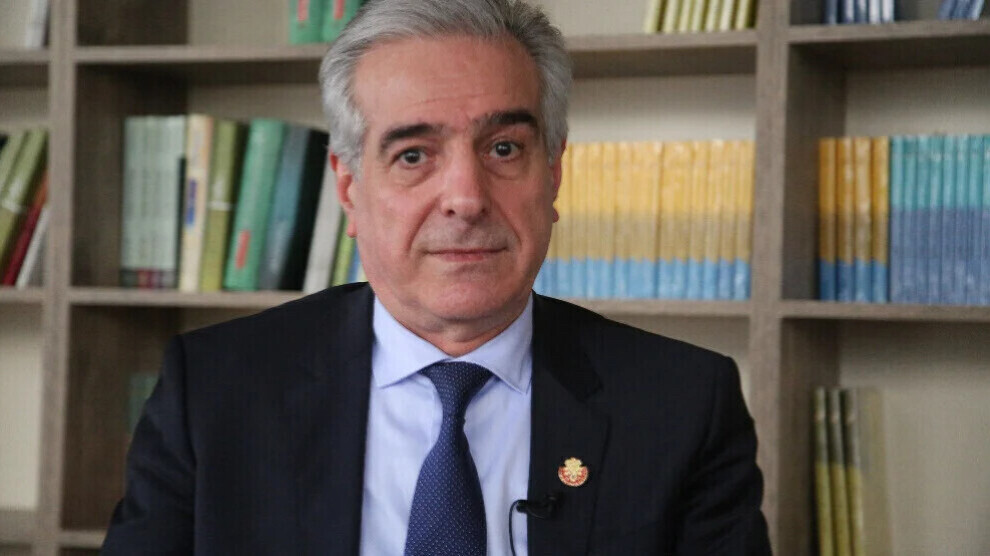Ahmed Karamus: We call on everyone to join us in Cologne on 29 June
A KNK-led rally will take place in Cologne on 29 June following a Brussels conference marking the 100th anniversary of the Sheikh Said resistance.
A KNK-led rally will take place in Cologne on 29 June following a Brussels conference marking the 100th anniversary of the Sheikh Said resistance.

The 100th anniversary of the Sheikh Said uprising is approaching, marking a pivotal moment in Kurdish history. The uprising was launched in response to the Turkish Republic’s failure to uphold its promises to the Kurdish people and its continued denial of their rights. Initiated by the Azadî Movement as a call for justice, the resistance was violently suppressed by the Turkish state. Sheikh Said and 46 of his comrades were executed on June 29, 1925, in Amed (Diyarbakır).
In the century that followed, the Turkish state has continued its policies of denial and destruction, while the Kurdish people have never ceased to demand their rights. On the 100th anniversary of the Sheikh Said resistance, the Kurdistan National Congress (KNK) will hold a two-day conference in Brussels, the capital of Belgium, on June 27 and 28. Immediately after the conference, a rally and march will be held in Cologne, Germany, on June 29.
KNK co-chair Ahmed Karamus spoke to ANF about the upcoming conference in Brussels and the demonstration in Cologne.
Karamus emphasized that the background of Kurdish uprisings, particularly in Northern Kurdistan (Bakur), during the Republican era remains largely obscured. He noted that it is crucial for Kurds to fully understand the motivations and developments surrounding these uprisings, which were sparked by demands for rights and freedom. Karamus explained, “Our aim is to discuss what happened before and after the Sheikh Said uprising, who it was directed against, what purpose it served, its historical background, and the consequences it brought. We want to speak honestly about the past.” He also recalled that a similar conference had been held on the centennial of the Treaty of Lausanne to confront historical truths.
Kurds were stripped of all rights with the Treaty of Lausanne
Ahmed Karamus stated that the Kurds were gravely wronged by the Treaty of Lausanne and that the Sheikh Said uprising emerged as a response to the injustices born out of this treaty. He noted that many progressive, intellectual, and even academic circles have conducted serious research around Sheikh Said. Karamus highlighted the differences between the 1921 and 1924 constitutions and remarked, “All cultural, legal, and constitutional rights granted to the Kurds prior to 1921 were seized through the Treaty of Lausanne.” According to him, this was one of the main factors that led the Kurdish people to rebellion. Karamus emphasized that the demands of Sheikh Said and his comrades remain relevant today. Referring to the current debates around resolving the Kurdish question in Turkey, he insisted that the issue can only be addressed through democratic means and through legal and constitutional reforms.
Karamus recalled the Kurdish people’s unwavering insistence on a solution and stated, “This conference is also a demand for reckoning. If true peace is desired, the injustices suffered by the Kurds must be acknowledged.” He pointed out the ongoing disinformation within Turkish state ideology about the Sheikh Said uprising, arguing that the state has sought to discredit the uprising by labeling it ‘reactionary’ in order to undermine its lasting impact. Contrary to this narrative, Karamus described the Sheikh Said uprising as “a rebellion driven by demands for rights and freedoms.” He noted that the conference would address all aspects of the uprising and could yield important insights for the Kurdish people’s current struggle. Karamus also reminded that key scholars who have produced significant work on the Sheikh Said uprising would be participating in the conference.
Kurds must act together for national unity
Ahmed Karamus underlined the importance of Kurds acting collectively on shared ground to achieve national unity. He emphasized the relevance of the upcoming conference for this goal, stating, “It is crucial for Kurds to form common ground as a whole, compare their shared historical experiences, and express their current demands. The Sheikh Said uprising was a movement born from national and democratic aspirations. Every uprising that followed, Dersim, Agri, Koçgiri, Zilan, Sason, had one common thread: the Kurdish people’s demand for democratic rights and freedoms. These examples show us that, throughout history, regardless of ideological differences, Kurds have fought collectively for their national and democratic rights. With this conference, we want to demonstrate that the spirit of that unity can be revived today.”
Karamus also noted that experts in the field, academics, researchers, and intellectuals, will participate in the conference, which will feature in-depth discussions on the Sheikh Said uprising. He invited everyone to follow the conference closely and emphasized the importance of the rally and march that will take place in Cologne on June 29, extending an open invitation to all Kurds.
In his concluding remarks, Karamus made the following call: “On June 29, Sheikh Said and 46 of his comrades were executed in Amed. A century has passed, yet we still do not know where their graves are. Through the rally we will hold, we are calling on both the Turkish state and the international community to locate the graves of our martyrs and ensure they are buried with dignity. This is part of the history of the Kurdish people. As the KNK, we are once again demanding this as part of our duty to honor all martyrs. Regardless of ideological differences, everyone should join this rally and embrace the Sheikh Said movement. We call on everyone to come to Cologne.”